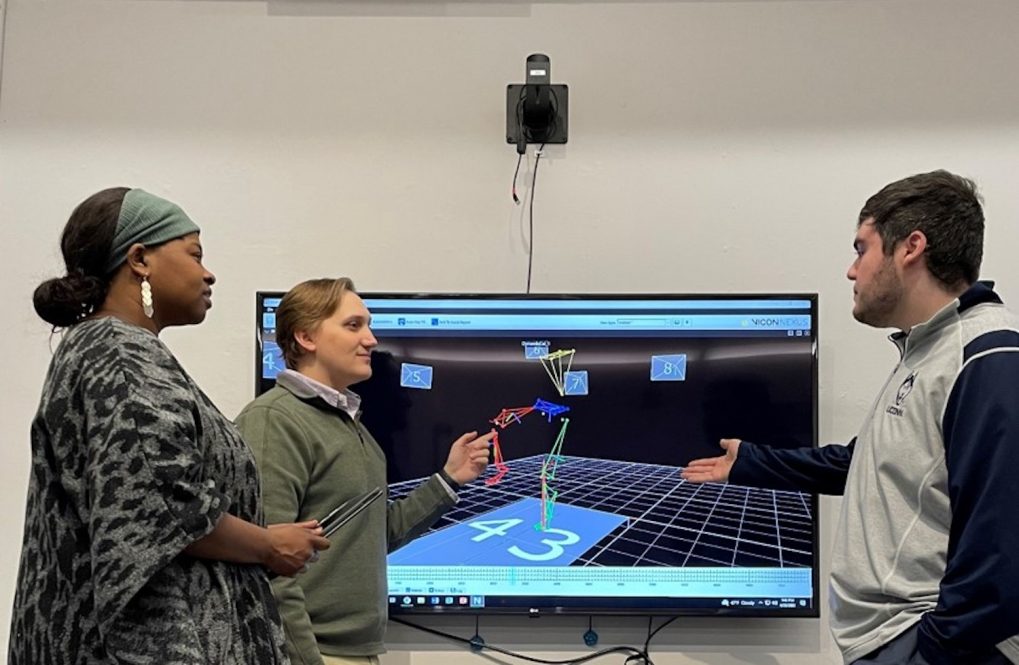The goal of rehabilitation for individuals with neuromuscular dysfunction is to improve the patient’s gait and, in so doing, reduce the risk of falling, increase mobility and reestablish independence.
Kristin Morgan, an Assistant Professor of Biomechanical Engineering at UConn, is investigating how to optimize rehabilitation strategies for such conditions by inducing positive motor learning through asymmetric walking protocols, a technique that intentionally introduces gait differences in opposing limbs using a specialized two-belt or instrumented treadmill.
Gait is the result of the coordinated action of musculoskeletal and neuromuscular systems. Pathological conditions that impact those systems, such as stroke and disorders like Parkinson’s or Huntington’s disease will change an individual’s gait patterns. Morgan’s work focuses on utilizing advanced data analytics and time-varying analyses to pioneer new ways to visualize and quantify gait dynamics to rapidly and non-invasively diagnose pathological conditions. She and her team have successfully identified individuals with neuromuscular and neurological impairments and are working to increase the number of conditions they can diagnose.
“My laboratory is focused on combining our experimental biomechanics and computational modeling work to determine the mechanistic changes in motor control that drive the adoption of healthy movement patterns,” says Morgan. “This, along with our clinical experiences, will support our larger goal of designing, optimizing, and implementing rehabilitation protocols and correcting detrimental gait strategies in pathological populations.”
Morgan’s pioneering work in gait biomechanics has earned her a 2022 Early Career Development (CAREER) Program Award from the National Science Foundation. She is one of 11 early-career faculty at UConn to receive the highly competitive award, which recognizes the recipient’s potential as a role model in education and research.
CAREER Awards come with five years of funding intended to provide a foundation for a young professor’s research program. As part of her project, Morgan will leverage her work in gait biomechanics and 3-D modeling to introduce underrepresented middle school students to STEM through hands-on, interactive activities such as the STEM In Motion summer program at UConn.
“I don’t think I had an African American professor, but I believed I belonged because both of my parents were in academics,” Morgan says. “Often, people of color are told they can’t do something. I want people to know that it’s possible. You don’t have to be perfect, and the path might not be linear, but you find a way.”
Morgan’s father was a tenured professor in Chemical Engineering at Rensselaer Polytechnic Institute. In 1996, he and her mother joined the faculty at Hampton University. Her dad was the Professor and Massey Chair of Environmental Engineering and served as the Dean of the School of Engineering from 1998 to 2003. Her mother was the Chair of Mathematics from 1996 to 2007.
Growing up, Morgan spent weekends watching her dad run races, her brother play basketball, and she played soccer herself. That involvement in sports sparked her interest in studying biomechanical engineering, she says.
She recalls the excitement she felt studying athletes at Duke and Virginia Commonwealth universities, where she earned undergraduate and graduate degrees in biomedical engineering. Her doctoral dissertation at the University of Tennessee focused on using dynamic simulations and data mining in relation to ACL injuries.
Another award Morgan received this year – a National Institutes of Health (NIH) K Award – will allow her to build on that work by funding her Asymmetric Walking Protocol research to improve rehabilitation from ACL reconstruction.
Along with monetary support, the K Award has a mentorship piece that will enable Morgan to work with three prominent researchers in her field: Dr. Cato Laurencin, a renowned distinguished professor of orthopedic surgery at UConn; Ki Chon, a professor and department head of Biomedical Engineering at UConn; and Brian Noehren, Director of the Human Performance and Biomotion Laboratories at the University of Kentucky and Morgan’s post-doctoral mentor.
Over the years, Morgan’s gait research has evolved well beyond sports. She now sees gait analysis as a powerful diagnostic tool and is developing uses for it she once could not have imagined. Since her arrival at UConn in 2016, she and her team helped establish the university’s first gait lab.
Currently, they are engaged in studies focused on the development of new metrics for quantifying optimal gait dynamics. In addition to the novel rehab protocol, they are also implementing and comparing gait differences associated with physical impairments and cognitive impairments, such as Parkinson’s and Huntington’s disease, and stroke.
For yet another project funded by the U.S. Navy’s Office of Naval Research, Morgan and her team have developed a wearable device to detect normal and abnormal walking patterns, including those associated with fatigue. The goal of the project is to create an algorithm that can predict from someone’s walking patterns if they are at risk of getting injured and what the injury might be.
“We are trying to use gait to improve people’s lives and encourage the next generation of researchers to come up with the solutions to do that,” Morgan says.



